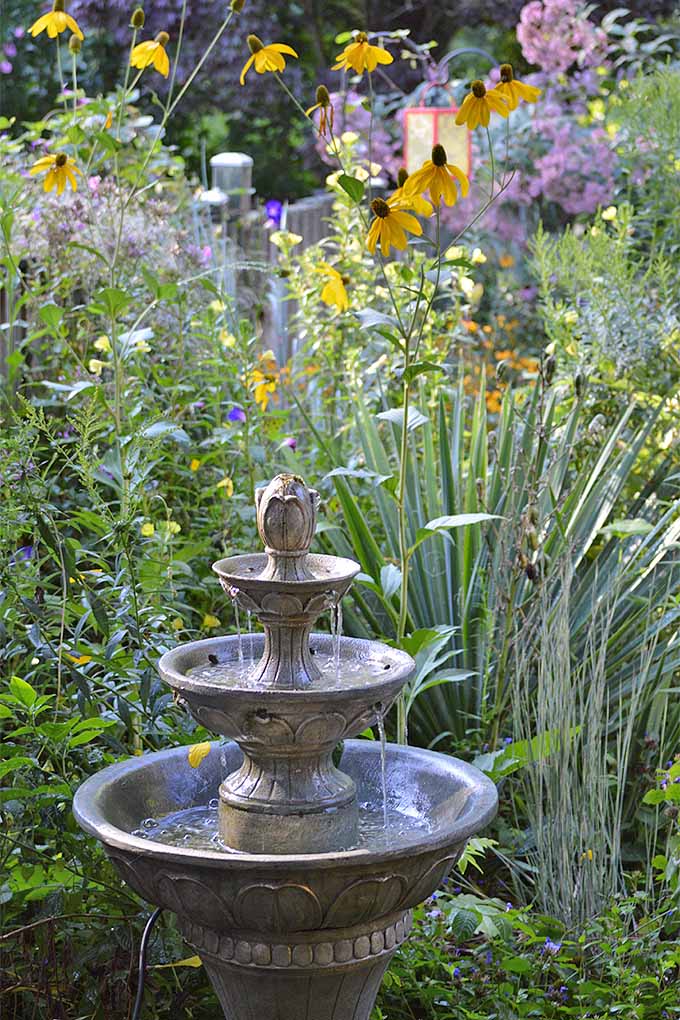Summary from Amazon:
"In this eloquent plea for compassion and respect for all species, journalist and gardener Nancy Lawson describes why and how to welcome wildlife to our backyards. Through engaging anecdotes and inspired advice, profiles of home gardeners throughout the country, and interviews with scientists and horticulturalists, Lawson applies the broader lessons of ecology to our own outdoor spaces.
Detailed chapters address planting for wildlife by choosing native species; providing habitats that shelter baby animals, as well as birds, bees, and butterflies; creating safe zones in the garden; cohabiting with creatures often regarded as pests; letting nature be your garden designer; and encouraging natural processes and evolution in the garden. The Humane Gardener fills a unique niche in describing simple principles for both attracting wildlife and peacefully resolving conflicts with all the creatures that share our world."
Reviews:
Library Journal: "This gorgeously written, well-argued title will help backyard gardeners see all creatures, from insects to elk, as visitors to be welcomed rather than pests to be removed. Highly recommended for gardeners at all levels in all regions."
Nancy Lawson's Website: http://www.humanegardener.com
Article by author, "Wild by Design" on the Humane Society site:
http://www.humanesociety.org/news/magazines/2017/09-10/wild-by-design-neighbors.html?credit=web_vanity_allanimals_id827141171
Humane Society Gardener sign: https://secure.humanesociety.org/site/Donation2?df_id=13521&13521.donation=form1&s_src=direct_hby
Radio Interview with Nancy Lawson: http://www.blogtalkradio.com/big-blend-radio/2017/07/15/big-blend-radio-humane-gardening-with-nancy-lawson
***Bucks County Audubon Society Event: We will be hosting Nancy Lawson, who will be conducting a demonstration at our Organic and Pollinator Gardens, discussing her new book, The Humane Gardener and also be doing a Book Signing from 10:00 to 12:00 on September 23 at our Visitor Center at Honey Hollow Environmental Center located on 2877 Creamery Road in Solebury near Peddler's Village. ***
Current Citizen Science Programs at Bucks County Audubon Society at Honey Hollow: http://www.bcas.org/?s=citizen+science
Useful native plant and helping pollinator sites:
>Native Plant Database for PA: http://www.dcnr.state.pa.us/forestry/plants/nativeplants/
>Bowman's Hill" www.bhwp.org
>Xerces Society: www.xerces.org
> Pollinator Partnership: www.pollinator.org
Quotes from the book:
"As I wage a halfhearted battle with barberry and other invaders that ended up here through no fault of their own, I often wish I could hold an international plant exchange with gardeners overseas, together reversing the sins of our horticultural past in whatever small way we can."
"What systemic insecticides are doing is they're breaking up 146 million years of coevolution."
"Your yard is part of a larger environment. And it's not like deer are coming into your living room and eating your couch. They're just trying to make a living."
Discussion Questions:
1.
What did you find surprising or intriguing in
this book?
2.
The author talks about how nature can creep into
your garden or yard, if you let it. What wonderful unexpected things have you
found?
3.
Have you had the opportunity to make changes in
your yards or gardens to make spaces for critters, including pollinators, snakes,
etc., to add native plants, to provide a water source, to reduce pesticide use,
turn lights off at night, etc.? If yes, what have you done and what have you
observed?
4.
“To make
the task of converting to wildlife-friendly plants less daunting, Parker
recommends starting with a dozen native wildflower species – four for each
season of bloom and adding a few grasses, fruiting shrubs, and nut bearing trees.”
What do you think of this recommendation? What are some of your favorite native
plants?
5.
What do you think of fighting invasives with
vigorous natives?
6.
The author states, “As I wage a halfhearted
battle with barberry and other invaders that ended up here through no fault of
their own, I often wish I could hold an international plant exchange with
gardeners overseas, together reversing the sins of our horticultural past in
whatever small way we can.” If you could, what plant would you hand off?
7.
What kind of problems, i.e. invasives, pests,
etc. do you have in your yard/garden and hope to solve, after reading this
book?
8.
Are you familiar with or have you participated in
any of the 150+ Citizen Science programs, like Monarch Watch, Bumble Bee Watch,
Audubon Christmas Bird Count, ebird, etc. and if yes, which ones?
9.
After reading Chapter 5, “ A Harvest for All:
Share the Bounty through Peaceful Coexistence”, where the author writes,
“Evolution towards a more humane ethic is not just a moral imperative but also
the only practical solution in an increasing crowded world. “, what are your
reactions to her ideas regarding treating humanely animals, such as deer, groundhogs,
skunk, opossums, raccoons, etc.? Have you had any personal experiences with any
of these animals?
10. What
suggestions in this book do you hope to incorporate in your own yard/gardens?




